- Home
- Hilary Mantel
Every Day Is Mother's Day Page 6
Every Day Is Mother's Day Read online
Page 6
Muriel often comes to sit here. She thinks it as good and orderly as anywhere in the house. Sometimes she looks inside the decaying cardboard boxes which are piled almost to the roof. There is dust an inch thick in places, spiders’ webs like veils from long-postponed weddings.
Isabel Field, standing on the Axons’ front path, was growing irritable. Why is it, she thought, that I am sure there is someone in there? There was no movement behind the curtains, nothing to hear, and in fact the house had less life about it than most properties standing empty; yet she was sure that someone was there. How many letters? Three or four. What do they do, throw them away or leave them on the mat in the hall? It’s their privilege, she supposes. Most of the mildly handicapped, people like Miss Axon, live in the world with no one pestering them. She has more urgent cases, wretched and worn women keeping house for incontinent parents who have ceased to recognise them; the paranoid and the dangerously deluded and the terminally ill, the children in institutional cots staring without comprehension at the bars. With the very old and the very young, Isabel feels afraid. At the two poles of birth and death, she sniffs unbearable conjectures in the wind. She functions on the middle ground. By temperament and habit of mind, she is unsuited to her work.
I have of course, she thought, a right to be here. It was more with herself than with the Axons she was irritated. She stepped off the path and peered into the bay window of the front room. It was too dark to see very much, just the outline of a fireplace and an old-fashioned dining suite. The high lattice gate to the back was not bolted. It creaked; of course, it would creak. These are two women alone, they do not maintain their property. She stepped through dead leaves, along a blank brick wall. A low sky, a neglected garden; October in melancholy retreat towards November. Sharply she knocked at the side door. It was four in the afternoon. She could see her own breath in the air, and a distant sickle moon. She knocked again; nothing. She felt that someone was watching her, watching with interest; discounted it as absurd. The house was built on a slope, higher at the back than at the front, so that when she tried to peer into the kitchen window it was too high for her, the bottom frame almost level with the top of her head.
There were steps down onto the overgrown lawn. She looked around for something to stand on—a bucket, perhaps. She jumped into the air to try to see into the kitchen, but she caught only a glimpse of a varnished cupboard door with a calendar pinned to it. If anyone is watching, she thought, I must look absurd. She wondered if she could get a grip on the windowsill and pull herself up for long enough to see if there was anyone in the kitchen. No, she thought, I draw the line at gymnastics, I am not trained for it. There must be another door, she thought, going into the kitchen or the hall from this sort of greenhouse. The panes were so filthy that she could hardly see inside. It seemed to be full of rubbish, boxes piled high. Something scurried away from her feet and she jumped aside. It was beginning to drizzle, and she realised suddenly that she had become very cold, and wanted a cup of tea. She pushed up her coat sleeve to look at her watch in the fading light: something past four. She walked back around the side of the house. It was like a place not occupied but still furnished, she thought, where some old person has recently passed away; and the relatives are going to come next weekend with a van, and take away what they call the decent stuff, and sell the good solid wardrobes for a couple of pounds each. There was a clean milkbottle with an envelope inside it. She bent down and touched it; coins jingled. Milk-money. She removed her hand quickly, feeling like a petty thief. She could not grow accustomed to the license her profession gave her to enquire into the lives of other people. To look through their letterboxes, which she now did. It is beyond me, she thought, how anyone learns much by looking through letterboxes. The doormat said WELCOME, in green. There were no letters, no pile of circulars, no bills left to lie by a person broken-hipped or hypothermic. It was early in the year for hypothermia. And the daughter was quite young, wasn’t she, and able-bodied, and reasonably capable? She had enough sense to get help, if anything was really wrong. The note in the milkbottle, left early, suggested people who had gone out and would be away for the evening; as if they might come back late, talkative and giddy, and forget to do it. It seemed an unlikely picture, but she supposed they might have friends, this odd mother and daughter who were familiar to her only from a buff-coloured file. The strangest people have friends, she thought, even me.
On the front path, she hovered again. One day, she thought, I shall always know what to do in these doubtful situations. When I am perfectly wise. When I am thirty years old. The rain began to fall harder. Deciding quickly, she turned and dashed back to the car, splashing the back of her tights. She was just going to miss the rush-hour traffic.
Up at her bedroom window, Florence turned away, to resume the living of her own life.
The new offices were open-plan. It was four-thirty-eight when Isabel got in. The day was winding down. In the old offices, with their brown peeling doors, over-subscribed lavatories, dingy walls, you could shut yourself into the little cubbyhole that was designated to you and rub your hands over your own one-bar fire. They had merits, but they were not pleasant for the clients to visit.
“Tea?” she said unhopefully.
“We’ve had it.”
“Messages?”
“On your desk.”
She walked over the expanse of blue cord carpet. There had been a phone call from the Probation Service. The Housing Aid office reported their failure to find housing for someone. A child with leukaemia would have to go back to hospital. What concerns are these of mine, she thought tiredly. The Education Welfare office had been ringing. And Mr. Sidney. This year social workers had become “generic.” It was a new dispensation, for everybody to know everything about everything: and how to heal it.
“What’s this?” she said to the secretary.
The woman looked up resentfully. “Your messages.”
“This last one—Mr. Sidney. Who is Mr. Sidney?”
“A personal call, that was.”
Oh yes, Isabel thought. Colin. Who’s going to leave home for me. She sat down at her desk and took the evening paper out of her bag. She read of a car-crash and a dog that had drowned. She did not want to go home, did not relish the evening ahead of her. But then she did not look forward, either, to the next working day. There is something radically wrong with my life, she thought, that I have fallen to such vicious amusements; and such stretches of emptiness between them.
It was almost seven when Isabel arrived home. The house was a brick-built bungalow, ten years old, of a solid and uninspired design. The lamps burned at each side of the wrought-iron gates, but Mr. Field had not drawn the curtains. She put the car into the garage, and let herself in at the front door.
There were no lights on in the hall, and before she found the switch she caught her foot against something soft, lying beside the telephone table. She bent down and explored it with one hand. It was a plastic carrier bag, a small one full of laundry. A tablecloth—which had been clean, she thought—a few pairs of socks, one shirt. Token laundry, this. Damp blue powder clung to her fingertips. She flicked it off. Her heart began to beat faster. Anger and fear, she thought, fight, and flight. If only we could ever do either. She tried to calm herself, standing with one hand against the wall. Mr. Field appeared at the top of the stairs.
“Is that you, Bella? You’re very late.”
“Just as well, it seems to me.”
He cringed at her tone.
“Come down here,” she said.
“I’ll make you a cup of tea. Oh Bella, please don’t work yourself up.”
He came down and stood before her, blinking and contrite, a man of seventy.
“You’ve been drinking,” she said.
“Just a nip.”
She kicked out viciously at the bag of laundry. “There’s nothing wrong with the washing machine.”
“Bella, I have to have some life. Your mother left me.”
> “The launderette. Why?”
“Meet someone.”
“Anybody in particular?”
“No,” he mumbled. “But you can always find someone at the Washerama.”
Her mouth was dry. She could picture them, loose-mouthed women with bare blue legs, buttons hanging off their coats. It was in the autumn that you noticed them. Had they any homes to go to?
“I suppose you brought her back with you. Do you have to bring them here?”
“It’s too cold for the park. Be human, Bella.”
“Oh, I feel sorry for you, I really do, having to get a bundle of washing together. I suppose otherwise the attendant turns you out, does she?”
“They watch you. They’re mean old cows. But they can’t stop people talking to each other, can they? Lonely people, Bella, like your father.”
“Oh, don’t start with that pathetic tone. You nauseate me. What happened to Woolworth’s café? That was favourite last year, wasn’t it?”
He turned away, moving slowly towards the kitchen. “I’ll put the kettle on,” he said.
“You disgust me,” she shouted after him. “Take the sheets off your bed and put them in the machine. I’m not going into your room.”
I always say that, she thought, but I shall have to go, and look at his clothes for lice. What can I do to stop him, whatever can I do? Unshed tears were choking her. She blundered into the living-room, snapped on the TV and slumped in front of it, staring without seeing, biting her lip till it bled.
“London Bridge is falling down,” Muriel sings, “bawling round, trolling frown.” One word is as good as the next. Her mother tells her she is going to have a child. She is making plans to sing to it.
When is it going to be born, Muriel wants to know. Tonight? You stupid, stupid girl, Evelyn says to her. She glowers. You should know that, not me. Despairing, she reminds herself how little comprehension Muriel has ever shown of past or future. Look, she said, you count, nine months. Nine months from the day you…got it.
There are two things she can do. Take Muriel to a doctor, or go to the Welfare and tell them what has happened. Lay the blame at their door, where it belongs. If she had stayed in the house with me, Evelyn thinks, she would have come to no harm, or comparatively little. If she does either of these things, it will be in an extremity. She is afraid that Muriel will be taken away. “Taken away,” she says. “There are places for people like you. There are places for girls who have babies and no husbands.” She thinks of the uniformed guards taking Muriel away, to shave her head and beat her. It is something she has often imagined. But then she imagines closing the door, finding herself alone; alone with her companions. When Muriel follows her up the stairs at night, and she feels them creeping up, creeping up snapping from the bottom stair, she always plans that if they get too close she will put her hand on Muriel’s chest and push her slithering down to them, fat bait, something to lick their lips over.
Sunday: Sylvia cooked roast beef (she does it brown, a full twenty-five minutes per pound plus twenty minutes), roast potatoes, carrots, frozen peas: rhubarb crumble, at which she is a dab hand, and custard.
CHAPTER 3
“Look,” Colin said, his hand half over the mouthpiece. “I can’t talk now. But why not Thursday?”
“Because Thursday is the writing class.”
“But you don’t really want to go there.”
“How do you know that I don’t?”
“You said you didn’t find any profit in it.”
“No, but much pleasure.”
“Isabel, please—look, I’m in the staffroom, I can’t talk.”
“Then what was the use of telephoning?”
“I wanted to fix something?”
“Well, then. But not Thursday.”
“It’s just that it’s such a good chance. Sylvia knows that I go out on Thursday.”
“Tell her you’re going out another night.”
He was awed by the simple terms in which she saw his predicament. “I—well, she might not just accept that.”
“That’s your problem.”
“Well—which night then?”
“Monday.”
“People don’t go out on a Monday. At the end of the week, that’s when they go out.”
“For pleasure, but not for business. You wouldn’t be going out for pleasure, would you, Colin?”
“No, that’s true. All right, I’ll think of something to tell her. Can we go to a film, would you like that?”
“Yes.”
“All right then, I’ll pick you up at half-past seven Monday, and we can have a drink first.”
“Fine,” she said. “Goodbye.”
“Isabel—”
But he had heard the click. He knew she had gone, and still went on calling her name. He stood still. He realised that her plan was better. He could see her on Monday, and on Thursday too. After the class they could go to the Duke of Norfolk. He would see her two evenings instead of one, and it was Friday already.
Where had she been last night? He hadn’t asked her. He could have raised the point, he could have said, ah, then why did you miss the class last night? But he hadn’t questioned her on that one. He’d been too relieved to hear her voice. She always seemed to be out, or engaged with a client. He rushed to the phone between lessons, piles of exercise books slipping about under his arm, wedging the receiver under his chin, trying to juggle his cigarettes and his lighter for a quick drag before the next forty-minute period. Sometimes Luther King House was engaged, solid, for hours. All the weary morning he rang her, through to spam fritters and steamed fruit pudding, and into the afternoon. Once he dropped a whole pile of books, and his colleagues looked up from their marking and card games, and he felt they had noticed he was agitated and red in the face. When he heard her voice at last he could hardly believe his luck was in; it seemed to him a miracle that she walked on the same pavements in the same town, that the line distorted her voice, like anyone else’s.
The tall and shady trees, the disconsolate sparrows huddling in the trees: these protected Evelyn and Muriel from observation. The oncoming winter stripped them of their shade, but because it was winter there was no need for Muriel to walk in the garden. By the end of October the plots were fenced by black arms held aloft, mourners from some more fervent culture; Brewer, Petty & Co. nailed up their signboard on 3 Buckingham Avenue, and Evelyn’s closest neighbours moved away. Sylvia remarked, when they next visited Florence, that the house would remain unsold until after Christmas; no one wants removals, she said, with Christmas upon us.
Evelyn gave Muriel some of her own old dresses. At five months, even six, Muriel didn’t show too much. She was tall, and ungainly at the best of times; her clothes had never been in the height of fashion. When in the end the dresses began to strain and pull in the middle, Evelyn went into the conservatory, and delved about among the boxes. She came out grey to the elbows with dust, lengths of fabric laid across her forearms.
She had found a pair of old blue curtains, very large. She hung them out on the line to get rid of the smell of must. When she brought them in they smelled of soil. Saxe-blue, she said, very nice. She took out a treadle sewing-machine and ran up a couple of garments for Muriel, two identical. She didn’t need a pattern. She could wear them turn and turn about. She wanted for nothing, Evelyn said.
Cards from the Welfare dropped through the letterbox; apart from the household bills, there was no other post. Muriel collected a stack of the cards. She held them in her hands and shuffled them until they were greasy and turned up at the corners. Evelyn took them from her in the end and burned them.
“Do you want to go to the doctor?” Evelyn asked. “Because if you do they’ll take it away when it’s born, and you’ll have nothing to show for it.”
Muriel seemed to have lost interest in life. She sat a good deal of the time with her eyes closed, her fingers in her ears. Then her fingers would pinch her nostrils closed; when Evelyn had first seen this trick
she had been distraught. “What is the smell?” she had demanded, trying to drag Muriel’s hand away from her face. “What is the smell?”
Soon she understood that Muriel was enjoying one of her strange holidays from the world. There was nothing she could do until the girl repacked the tattered baggage of her personality and came home. Sinking into immobility, Muriel would allow Evelyn to manoeuvre her around like a piece of furniture, putting her wherever convenient. I don’t know how I am going to manage, Evelyn thought, if she is like this when the baby comes.
So Monday morning brought relief. Muriel was back. Her pale eyes travelled around the house, without interest, but more freely than of late. “You are being a good girl today,” Evelyn said kindly. Muriel got up and took herself upstairs to the lavatory.
Evelyn was in the kitchen when the knocking started up at the front door. Muriel heard it too. I know what is done, she thought, or what can be done, when that noise starts up. She remembered to rearrange her clothes, or to do as much rearrangement as was necessary under the enveloping blue dress. She watched her large feet going before her, placing themselves slightly sideways on each descending stair.
Evelyn snatched the pan off the stove. As she blundered down the hallway, she felt tiny malignant hands pull at her skirt and catch at her ankles. She could not, could not, make headway.
Her face contorted with effort and alarm. “Muriel!” Muriel turned her head, gave her a blank look, her hand on the catch of the front door; then a slow, spreading smirk. The door swung open, framing mother and daughter, as if they had come to open it together in an expansive gesture of welcome.

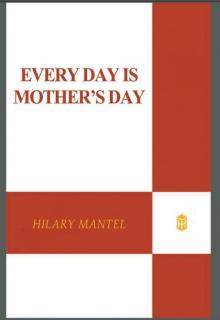 Every Day Is Mother's Day
Every Day Is Mother's Day An Experiment in Love
An Experiment in Love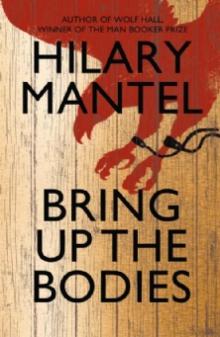 Wolf Hall
Wolf Hall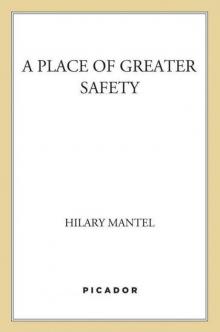 A Place of Greater Safety
A Place of Greater Safety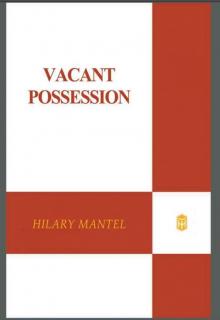 Vacant Possession
Vacant Possession The Giant, O'Brien
The Giant, O'Brien Beyond Black
Beyond Black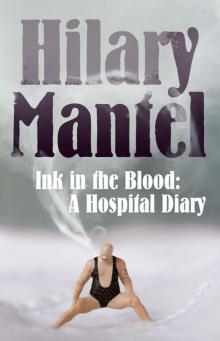 Ink in the Blood: A Hospital Diary
Ink in the Blood: A Hospital Diary The School of English
The School of English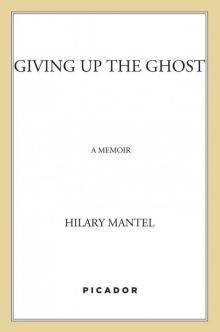 Giving Up the Ghost
Giving Up the Ghost The Mirror and the Light: 2020’s highly anticipated conclusion to the best selling, award winning Wolf Hall series (The Wolf Hall Trilogy, Book 3)
The Mirror and the Light: 2020’s highly anticipated conclusion to the best selling, award winning Wolf Hall series (The Wolf Hall Trilogy, Book 3) Fludd
Fludd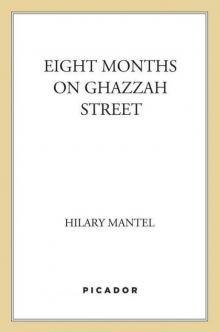 Eight Months on Ghazzah Street
Eight Months on Ghazzah Street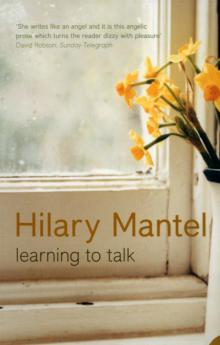 Learning to Talk
Learning to Talk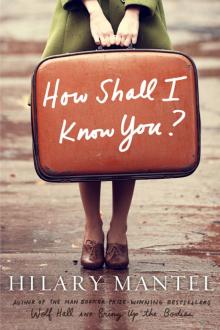 How Shall I Know You?: A Short Story
How Shall I Know You?: A Short Story A Change of Climate
A Change of Climate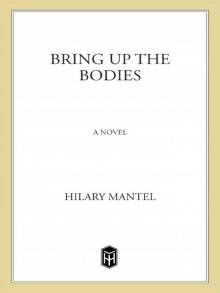 Bring Up the Bodies
Bring Up the Bodies The Assassination of Margaret Thatcher: Stories
The Assassination of Margaret Thatcher: Stories Beyond Black: A Novel
Beyond Black: A Novel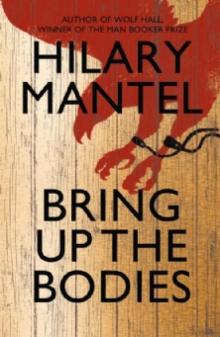 Wolf Hall: Bring Up the Bodies
Wolf Hall: Bring Up the Bodies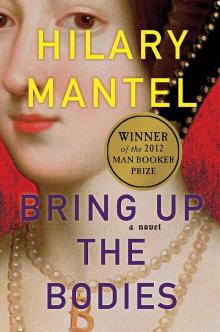 Bring Up the Bodies tct-2
Bring Up the Bodies tct-2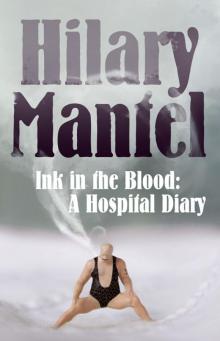 Ink in the Blood
Ink in the Blood The Assassination of Margaret Thatcher
The Assassination of Margaret Thatcher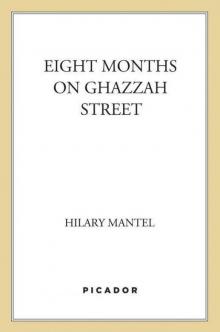 Eight Months on Ghazzah Street: A Novel
Eight Months on Ghazzah Street: A Novel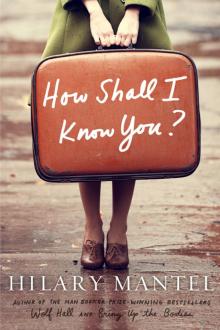 How Shall I Know You?
How Shall I Know You? A Change of Climate: A Novel
A Change of Climate: A Novel The Giant, O'Brien: A Novel
The Giant, O'Brien: A Novel Fludd: A Novel
Fludd: A Novel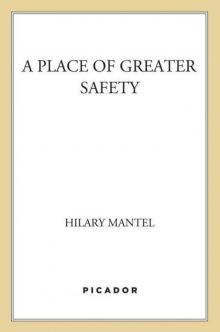 A Place of Greater Safety: A Novel
A Place of Greater Safety: A Novel An Experiment in Love: A Novel
An Experiment in Love: A Novel